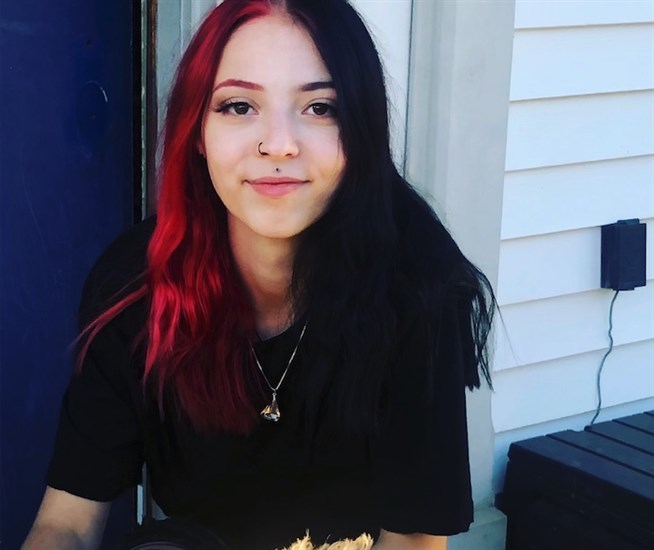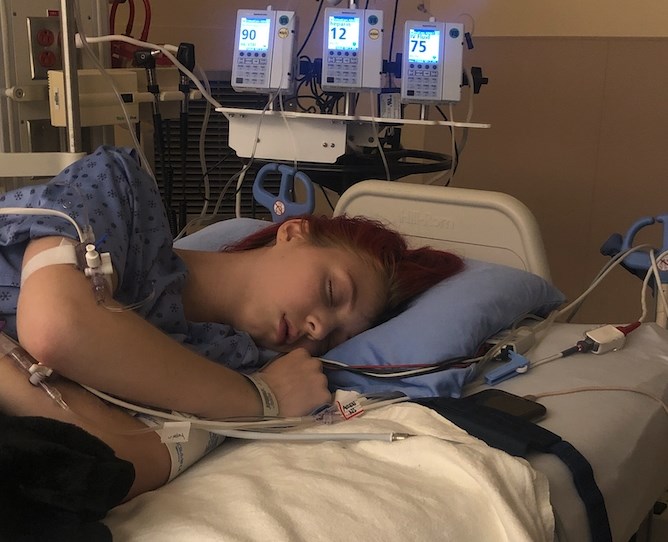
Chelsea Roszell.
Image Credit: SUBMITTED: Wendy McGhghy
December 09, 2020 - 6:30 AM
One month ago, Grade 12 student Chelsea Roszell was focused on her impending graduation and between playing her guitar and dying her hair, thinking about where life would take her.
Now she's relearning which objects are hot and which are sharp. The 17-year-old has just had a stroke.
Less than one month after Roszell's mother found her laying on her bedroom floor trying her hardest to scream for help, the 17-year-old is back home after weeks in the hospital. She now has the challenge of putting back the pieces of her life.
“Her brain is damaged, there are parts that are severely damaged and parts that are partially damaged,” Roszell's mom Wendy McGhghy told iNFOnews.ca. “(But) she's got plans, she's got dreams which she's not going to give up."
It happened on Remembrance Day. McGhghy was at home when she heard an odd noise coming from upstairs. She originally dismissed it as her 12-year-old son playing video games but then ventured into Roszell's room and saw her lying on the floor.
An ambulance took Roszell to Vernon Jubilee Hospital and a CT scan revealed a blood clot. She was given a drug to break down the clot and rushed to Kelowna General Hospital. She then underwent surgery but it failed to remove the entire clot.
Doctors then started another aggressive treatment.
"It was a bit risky but so was doing nothing," McGhghy said.
Luckily it worked and removed the blood clot.
She’s now started the long path of rehabilitation, complicated by the fact that teenagers very rarely have strokes.
“Kids don't have strokes as a general rule so there's not a lot of knowledge," McGhghy said. "It just doesn't happen.”
That lack of knowledge means there is no clear timeline for how and when and to what degree Roszell's brain will repair itself.
Immediately after the stroke Roszell was unable to move the right side of her body.
"At that time (doctors) said it would be months and maybe years before she could walk," McGhghy said. "Then she got up and walked.”
It’s just one example of the unknowns in the recovery path of a teenage stroke victim.
According to the Heart and Stroke Foundation of Canada, a stroke will affect three to six of every 100,000 children over one month old but is far more likely to happen before the child's first birthday. The organization doesn't have any accurate numbers on the number of teenagers that have strokes.
Heart and Stroke Foundation director of health system change Patrice Lindsay said Roszell is now facing an intense period of recovery, but has the advantage of youth and being otherwise healthy.
“There are no guarantees, but she has a really good chance to do well,” Lindsay said, speaking generally about teenagers who experience strokes.
But the rarity of the condition has made it very difficult for doctors to give advice on how Roszell's recovery will go.
"They just don't know, they don't know how her brain is going to heal... they don't have any data," McGhghy said.

In the hospital in Kelowna.
Image Credit: SUBMITTED: Wendy McGhghy
As it stands, doctors don’t know why Roszell developed a blood clot in the first place, and McGhghy said all the tests have come back negative.
While the road ahead will be long and is full of unknowns for Roszell, there are many signs of hope. Her brain is starting to heal.
"Right after the stroke, she couldn't talk," McGhghy said. "She couldn't read or text or spell."
Then as she learnt to talk again, a lot of her vocabulary was just nonsense words.
"She tried texting people and it's just a mumbo jumbo of letters that make no sense, even though she would think they were making sense,” she said.
But there have been big improvements. McGhghy said if someone didn't know her daughter had had a stroke they may not be able to tell. For McGhghy though, it's very clear and says her daughter now has a child-like nature to her.
The complexities of having a stroke means that while Roszell can hold a conversation, she’s also forgotten a lot of basic life lessons.
She's relearning that the oven is hot, that knives are sharp. It’s a long process and it's difficult not knowing what information Roszell has lost.
In a recent test she was found to be functioning at less than one per cent of where a 17-year-old should be.
"It seems like when she doesn't understand something that we think she should understand, when we explain it to her then she remembers it and then she's OK," McGhghy said.
It’s complicated though, as McGhghy doesn’t know what her daughter doesn’t know anymore. It’s up and down from minute to minute.
With time and rehabilitation, Roszell’s brain will gradually repair itself, although to what extent isn’t known.
The rarity of a teenager having a stroke is also leaving gaps in the care Roszell now needs.
There is no stroke aftercare in the Okanagan for those under 18 and the stroke aftercare programs that do exist all cater to a dramatically different age group with different needs. While the Stroke Recovery Association of B.C. runs a Young Stroke Survivors program it's still only open for those over 18.
While Roszell was getting speech therapy along with physiotherapy and occupational therapy on a daily basis in the hospital, since returning home speech therapy has become a once a week online session. She's still waiting to see what outpatient physiotherapy and occupational therapists can offer, but regardless of their expertise, it's highly unlikely either therapist will have any experience working with a teenage stroke victim.
As a mother, McGhghy is steadfast in her advocacy for her daughter and believes when it comes to cognitive therapies, she needs them every day, something unlikely to happen under the provincial medical system.
"It's not an option for her not to recover to the best of her ability," she said. "Whatever that requires is what will happen, one way or another, that will happen."
Making this a reality won’t be easy. McGhghy has had to give up up her full-time job as a care aid to look after her daughter and the family of four has now been reduced to one income. McGhghy's sister Corrine Erickson has set up a Gofundme page in an effort to help out.
The future may be uncertain but Roszell is adamant she’ll graduate next year, so much so she’s due to go and pick up her cap and gown in a few days. She wants to become a hairstylist and has her heart set on going to hair school in Vancouver.
McGhghy says as it stands they’ll continue as if that’s going to happen and keep working towards credits for graduation.
Emotionally she’s doing better since she came home from the hospital but it's tough.
“She's overwhelmed, and she's mad and she's sad and she's happy and she's grateful,” McGhghy said.
Pandemic restrictions are also having an effect. Her friends can’t visit, and too much screen time gives her headaches. She also struggles to read lengthy online messages.
Remarkably, while Roszell has so much to relearn, one thing she can remember clearly is having the stroke.
“She remembers the whole thing,” McGhghy said.
McGhghy said her daughter remembers lying on her bed and feeling a sharp pain like a bad headache, and thinking about going downstairs to get some Advil. But when she stood up her whole right side didn’t work and she fell. She remembers lying on the floor paralyzed trying to make a sound to call for help. She can even remember the ambulance ride to the hospital.
It seems almost cruel that the brain would retain such a memory, but forget the basics. Either way, the creative teenager who likes to draw, play the guitar, and listen to music now has a long road ahead of her.
“She's obviously very strong, there's no doubt about it, she breaks all the moulds, all the rules, and does things her way, always,” McGhghy said.
For her mother, it’s also an emotional ride.
“Every time she gets better I feel like I'm getting better, every day I can see improvements in her and that's what it's about,” she said. “We've had lots of support already in a time that's rough for everyone, it’s pretty humbling.”
The Gofundme page set up for Chelsea Roszell can be found here.
To contact a reporter for this story, email Ben Bulmer or call (250) 309-5230 or email the editor. You can also submit photos, videos or news tips to the newsroom and be entered to win a monthly prize draw.
We welcome your comments and opinions on our stories but play nice. We won't censor or delete comments unless they contain off-topic statements or links, unnecessary vulgarity, false facts, spam or obviously fake profiles. If you have any concerns about what you see in comments, email the editor in the link above.
News from © iNFOnews, 2020